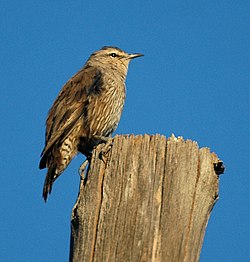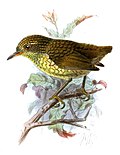| Climacteris | |
|---|---|
 | |
| Brown treecreeper (Climacteris picumnus) | |
| Scientific classification | |
| Kingdom: | Animalia |
| Phylum: | Chordata |
| Class: | Aves |
| Order: | Passeriformes |
| Family: | Climacteridae |
| Genus: | Climacteris Temminck, 1820 |
| Type species | |
| Climacteris picumnus [1] Temminck, 1824 | |
| Synonyms | |
Whitlocka G. M. Mathews, 1912. | |
Climacteris is a genus of bird in the family Climacteridae. These birds and the other members of the family, genus Cormobates , are similar to Northern Hemisphere creepers, Certhiidae, in climbing helically up tree trunks looking for insect food. Differences from Cormobates are
- Climacteris species have black, slightly downcurved bills.
- They have a rusty chest stripe in the female. (In Cormobates the female is marked on the face.)
- They have simple vocal repertoires that are the same for both sexes.
- They lay heavily marked pinkish eggs (Simpson and Day 1999).
- They are cooperative breeders; male offspring of previous broods and sometimes other individuals help breeding pairs (Doerr, 2003).
It contains the following species:
| Image | Scientific name | Common name | Distribution |
|---|---|---|---|
 | Climacteris affinis | White-browed treecreeper | Australia. |
 | Climacteris erythrops | Red-browed treecreeper | Australia |
 | Climacteris picumnus | Brown treecreeper | Cape York, Queensland, throughout New South Wales and Victoria to Port Augusta and the Flinders Ranges, South Australia |
| Climacteris melanurus | Black-tailed treecreeper | north and northwestern Australia | |
 | Climacteris rufus | Rufous treecreeper | Australia. |
The Australian author G. M. Mathews published new generic names in 1912, based on characteristics that distinguished two species from this genus,
- Whitlocka, to describe the black-tailed northwestern species, Climacteris melanurus . The generic epithet honoured the ornithologist F. Lawson Whitlock. [2]
- Neoclima, assigning the species Climacteris picumnus, brown treecreeper, of Temminck as the type. [3]
